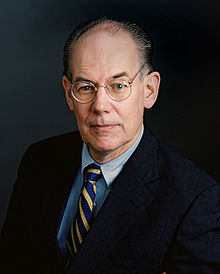- Offensive realism
-
In international relations, offensive realism is a variant of political realism. Like realism, offensive realism regards states as the primary actors in international relations. However, offensive realism adds several additional assumptions to the framework of structural realism. John Mearsheimer developed this theory in his book The Tragedy of Great Power Politics.
Theory
Offensive realism is a structural theory which, unlike the classical realism of Morgenthau, blames security conflict on the anarchy of the international system, not on human nature or particular characteristics of individual great powers. In contrast to other structural realist theories, offensive realism believes that states are not satisfied with a given amount of power, but seek hegemony (maximization of their share of world power) for security and survival.
John Mearsheimer summed this view up in his book The Tragedy of Great Power Politics:
“ Given the difficulty of determining how much power is enough for today and tomorrow, great powers recognize that the best way to ensure their security is to achieve hegemony now, thus eliminating any possibility of a challenge by another great power. Only a misguided state would pass up an opportunity to be the hegemon in the system because it thought it already had sufficient power to survive. ” This behavior is known as "power maximization." In this world there is no such thing as a status quo power, since according to Mearsheimer:
“ A great power that has a marked power advantage over its rivals is likely to behave more aggressively, because it has the capability as well as the incentive to do so. ” States fear one another, as they assume that the other state intentions are not benevolent. The states have various goals, but survival is the most important one. Whenever states cooperate, such initiatives are doomed to be unsuccessful or short-lived, as the fear of one another, desire for hegemony and security, driven by the need to survival, create fatal tensions.
As John Mearsheimer has been quoted in explaining, Offensive Realism follows from a core of assumptions from basic Realism. These are:
- The international system is anarchical
- States are rational
- States have survival as their primary goal
- All states possess some offensive military capability
- States can never be certain of the intentions of other states (i.e. all states are security seeking)
Offensive realism also dismisses democratic peace theory, which claims that democracies—specifically, liberal democracies—never or rarely go to war with one another.
Criticisms
Political scientists whose primary focus is bargaining models of international conflict note that Mearsheimer's offensive realism ignores the fact that war is costly. Since those costs in turn make war inefficient, states (even those who do not have hegemony) have incentive to construct bargained settlements. For instance, in a bipolar world with a 70%/30% power breakdown, states would prefer a corresponding 70%/30% breakdown in resources rather than having some of those resources destroyed over the course of fighting. Due to this inefficiency--war's inefficiency puzzle--the constant fighting Mearsheimer proposes would actually make states less secure because the repeated costs of fighting eventually deplete all of that state's power.
References
- IR Theory knowledge base
- Mearsheimer, John J. (2001). The Tragedy of Great Power Politics. New York, NY: Norton. ISBN 0393020258.
International relations theory Realism Neoclassical realism · Neorealism · Classical realism · Offensive realism · Defensive realism · Liberal realism · Relative gains · Absolute gains · Strategic realismLiberalism Idealism · Democratic Peace Theory · Republican liberalism · institutionalism · Neo-liberalism · Sociological liberalism · Institutional liberalismConstructivism Marxism Other theories Anarchy in international relations · International Political Economy · Feminism · Green Theory · World-systems theory · Structuralism · Post-structuralism · The English School · Functionalism · Post modernism · PostcolonialismClassifications Critical Theory · Dependency theory · Positivism · Postpositivism · Rationalism · Reflectivism · Foundationalism · Anti-Foundationalism · Behaviouralism · Explanatory and Constitutive approaches · "Great Debates" · Inter-paradigm debateCategories:
Wikimedia Foundation. 2010.

